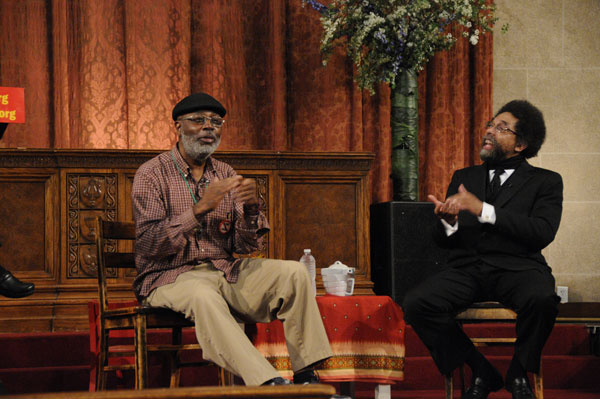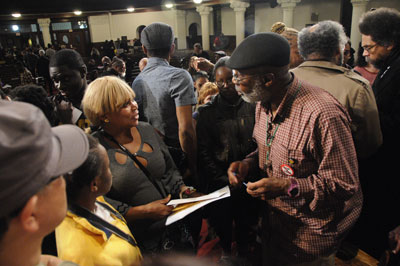Report from the Cornel West-Carl Dix Dialogue on Mass Incarceration
June 9, 2013 | Revolution Newspaper | revcom.us
From a reader:
On a summer-like night in New York City, more than 400 people gathered on the Upper West Side to listen to and engage with Carl Dix and Cornel West at a dialogue called "Mass Incarceration + Silence = Genocide—Act to STOP It Now!"

Photo: Li Onesto/Revolution
This event (which was a fundraiser for Revolution Books and the Stop Mass Incarceration Network) came just days after the indictment of the officer who had gunned down unarmed Ramarley Graham in his own home in the Bronx last year was overturned on a "technicality," and in the midst of the still-running civil suit against stop-and-frisk. This charged atmosphere seemed to lend extra urgency to the question on people's minds. People were anxious and eager to hear what the speakers had to say—just announcing the title at the beginning of the program led to a lengthy ovation (the first of many).
The composition of the audience showed how all kinds of people are concerned and angry about mass incarceration and its effect on the lives of millions. Ages ranged from a pre-teen member of a dance troupe (along with the other troupe members of all ages), to veterans of the struggles of the '60s like an older couple with matching gray-haired ponytails, and a man who identified himself as a participant in the Attica Prison rebellion in 1971. There was a significant number of young people in their 20s and 30s, both male and female, of all nationalities, including eight students from a college class who were encouraged to go by their professor. Some members of the Revolution Club also represented—at one point they gave a demonstration of whistle-blowing technique, to warn people of the presence of police, when the co-emcee Jamel Mims was describing "Whistle Day."
A real determination to stop this genocidal program seemed to burn through this audience. Right from the start, the spirit in the room was that of people getting together not just to hear about the horrors of mass incarceration but to join in a struggle to end it. Both speakers stressed again and again that this is an emergency situation, and that only by acting now, and having the courage to stand against the "prevailing winds" of society—ideological, cultural, and political—can this be defeated. And both also stressed that it can be defeated. There were ovations and shouts of agreement when each of the speakers focused on people acting to stop this now.
Carl Dix kicked off the evening with vivid descriptions of the torture of solitary confinement, the murder of Trayvon Martin and the savage beating of a Latino man by police in Bakersfield, California. He got into the importance of standing up against injustice with a little about his own experience, refusing to be sent to fight at the time of the war in Vietnam. He described how mass incarceration was a "slow genocide—which could become a fast genocide." He also called it a "counter-insurgency strategy without an insurgency"—how the rulers are preemptively using these methods to beat down and destroy what could be the most volatile section of society. He went on to talk about how people must get active around this: "Walking out of this church tonight you have got to get involved. Because like I said, we are not fighting an issue here and an issue there; we are fighting mass incarceration and we are aiming to stop it. And there is something everybody can do to help win this fight." Later he added, "You will be recognizing the humanity of those beaten down by the system and in the process reclaiming your own humanity."

People stayed after the dialogue to talk with the speakers.
Photo: Li Onesto/Revolution
He also spoke about how this could fit into building a movement to get rid of all of this once and for all: "I'm coming at this as a revolutionary communist, somebody who sees mass incarceration and all the other horrors that this system inflicts on people here and around the world as rooted in the very nature of this capitalist system and its dog-eat-dog ethos. This suppression is built into the very fabric of this society." He went on to say, "There is not going to be a savior coming down from heaven or the White House who can or would do anything about it. It is going to take a revolution and nothing less to end this horror and all the other horrors the system brings down." He compared the role the enforcers play in this society—terrorizing and murdering people, especially the oppressed, to uphold a criminal system, with the role police could have in a different society—to the society that is envisioned based on the new synthesis of communism developed by Bob Avakian where the public security forces would be acting in the interests of the great majority of people in society—as described in the Constitution for the New Socialist Republic in North America (Draft Proposal), which Dix invited people to check out.
Cornel West, describing himself as a "revolutionary Christian in the Christian prophetic tradition," started from the rebellious and radical history of Black people fighting against injustice, invoking W.E.B. Dubois: "How do you maintain integrity in the face of deception?" He continued, "We are in a state of emergency—we need a sense of urgency." He talked about how people are "bombarded every day with a corporate media that makes cultural 'weapons of mass distraction'—making it difficult to attend to the things that really matter. And worse, we are witnessing the escalation of complacency, conformity and cowardice especially among our professional classes—as they become so intoxicated with wealth, power and status that they have become not just thoroughly well-adjusted to injustice but thoroughly well-adapted to indifference, and try to tell young people that the end and aim of life is just to be successful like them."
Toward the end of his presentation, he addressed young people: "What do we tell the young folk? We are going to tell young folk that we love you, we care for you, and we are willing to go to jail for you—we want to shape your consciousness, we want to show you that there are some old-school brothers and sisters willing to put their bodies on the line—because folks put their bodies on the line for us. We need more people—especially among the youth. Brother Carl has been going at it for decades, and he can't break dance the way he used to."
The young revolutionary Noche Diaz also made a short presentation, and he spoke for those younger people who have begun to step forward, and called on others to do the same. He said, "The message is that there are people who are going to be fighting against this—and when people inspire and organize others to stand up against this and they face the wrath of the system, they are not going to be standing alone. And we are going to get stronger through those attacks—and those attempts to silence people and disorient people and crush the resistance—we are going to get stronger through meeting those attacks. Stop-and-frisk is on trial now because of what people did in the streets."
About half the crowd stayed through the question-and-answer period and the short final presentation on how to get involved. And a large section of that group stayed to talk to the speakers and organizers after the program ended (including many of the younger folks)—a group that was ready to act and was looking for ways to get involved and wanted to hear about (and be involved in creating) plans to oppose mass incarceration going forward from this program.
WATCH THE DIALOGUE HERE
If you like this article, subscribe, donate to and sustain Revolution newspaper.
